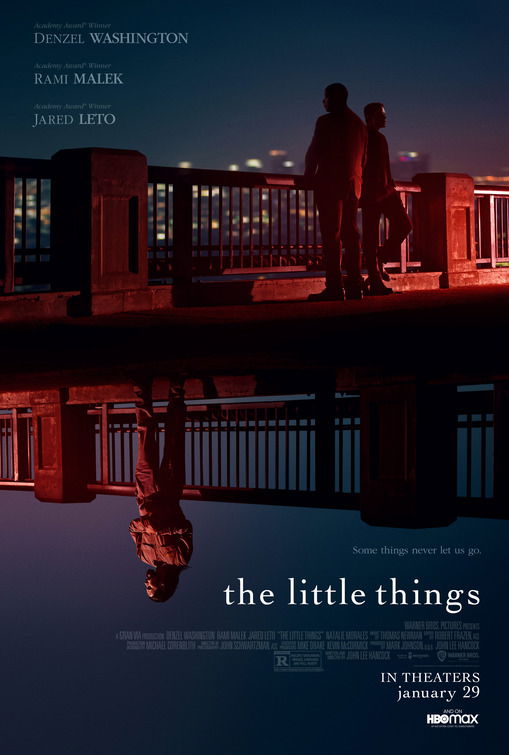“Anti-climactic, Politically Correct and Ultimately Annoying”

| None | Light | Moderate | Heavy | |
|---|---|---|---|---|
| Language | ||||
| Violence | ||||
| Sex | ||||
| Nudity |
What You Need To Know:
THE LITTLE THINGS has some provocative themes and metaphors. Also, the performances are good. However, the ending is annoying, anticlimactic and politically correct. For example, the two homicide detectives never find the serial killer’s true identity. Also, they commit a couple major crimes themselves and then cover up the crimes. Finally, one of the detectives lies to the other detective about a major issue. THE LITTLE THINGS also contains lots of foul language, bloody scenes of violence and explicit nudity. All these problems are not little things. They are very big things.
Content:
Strong humanist, politically correct worldview that, in the end, turns the main homicide detectives in the movie into bad guys who cover up their own crimes and mistakes or their partners’ crimes and mistakes and never find the two serial killers in separate cases in Los Angeles, the former homicide detective lightly mocks a Bible verse reference to Proverbs 17:17 on his former boss’ office wall and calls the boss’ detectives under him the boss’ “disciples” and tells another homicide detective that there are “No angels,” plus there are some moral elements about trying to catch and stop serial killers but the movie’s ending undercuts the viewer’s identification with homicide detectives trying to catch and stop killers, so the ending is kind of depressing, iconoclastic and morally annoying, not just politically correct
33 obscenities (most are relatively light but about seven are “f” words), one strong Jesus profanity, five light exclamatory profanities
Some very strong and strong, sometimes bloody, violence includes images of bloody nude female corpses, police officer scuffles with a suspect in an interrogation room, driver menaces a girl who runs from him but stops a truck (it’s not revealed what happened to her after the truck stops for her), startled man accidentally shoots a woman in the chest, angry man hits another man in the head with a shovel, and the man dies
Serial killers in two separate cases leave female victims nude, and there are some references to prostitution
Two or three images of full frontal female nudity, plus several images of upper female nudity, and at least one image of rear female nudity
Brief alcohol use
No smoking or drugs; and,
Police officer searches a suspect’s home without a warrant, police officers cover up an accidental killing and the death of a man deliberately hit (in anger) in the head with a shovel, medical examiner covers up an accidental killing, police officer burns a dead suspect’s belongings to make it appear the suspect just took off and vanished, police officer lies to another police officer to assuage the man’s guilty conscience (partly because the man has a wife and two young daughters).
More Detail:
The movie opens on a young woman driving a car at night on a rural road somewhere around Los Angeles. She’s chased by a strange man driving a car. She tries to find help at a small market and gas station, but it’s completely closed. Running for her life, she manages to stop a truck traveling on the rural highway.
Cut to Kern County Sheriff’s Deputy Joe Deacon talking to the owner of a standalone Black Angus steakhouse. The owner complains about people breaking one or more of the neon lights on his Black Angus sign, which cuts into his profits.
Back at the county sheriff headquarters in Bakersfield, Calif., the county seat of Kern County, a newspaper headline on a desk says that the fourth female victim of a serial killer has been found in Los Angeles. Joe starts walking to his desk, but his boss stops him and orders him to drive all the way to the Los Angeles County sheriff’s office and get two boots worn by a robbery suspect who’s been accused of crimes in both Kern County and Los Angeles.
In Los Angeles County, Joe has to go to the homicide division to get the boots, but he can’t get them until the next morning, after the forensics team completes a test on some bloodstains found on the boots. At the homicide division, Joe runs into his old partner, Sal Rizoli (played by Chris Bauer), and Sal’s new partner, a young hotshot detective named Jim Baxter, played by Rami Malick.
While Joe and Sal share a cup of coffee across the street, Jim comes into the diner to grab Sal. A fifth victim of the serial killer has been found in an apartment. She’s been dead for two or three days. Jim invites Joe to tag along with them to the crime scene.
The crime scene they discover is pretty gruesome. It reminds Joe of the final case he worked with Sal in Los Angeles. In that case, the nude bodies of three different women were found in a grassy woodland next to a freeway or highway.
Joe becomes obsessed with the new case just like Jim has. Joe decides to take a few vacation days to help Jim. He and Jim think a missing woman may be the serial killer’s sixth victim, but, if so, where’s her body? Or, could she still be alive somewhere?
Joe finds some small clues associated with the fifth victim. They lead the two detectives right away to a strange young man named Albert Sparma (Jared Leto), who likes to taunt the police officers and joke around with them during interrogation. He doesn’t seem to take things seriously, which makes Joe particularly angry.
Proving a case against Albert turns out to be tougher than they thought, however. Albert fits the serial killer’s profile, of a man who likes to travel around the area where he lives. Joe and Jim think they’ve found their man when they discover Albert visited the crime scene of the first victim, the location of which was never revealed to the press. Other than that, though, there’s no evidence tying Albert to the murders.
Meanwhile, Joe’s still haunted by the case of the three murdered women. The killer in that case also hasn’t been found.
Joe’s tendency to bend or even break the rules begins to infect Jim attitude toward the new case. Jim’s also under increasing pressure to find the killer, because the public is starting to clamor for the FBI to take over the case. Also, a secret about Joe and Sal’s handling of the old case doesn’t help matters. Nor does the prime suspect, Albert’s, penchant for taunting Joe and Jim and playing mind games with them. Albert seems to truly enjoy sticking it to these cops.
Eventually, Albert’s annoying disdain for them leads Jim and Joe to bend and even break the rules. Is Albert really the killer? Can Joe and Jim find the evidence to pin the murders on Albert?
This movie’s title, THE LITTLE THINGS, has multiple meanings. At first, Denzel’s Washington’s comment about the little things is about finding the little clues that even a clever murderer can expose the real culprit of a murder or other crime. Then, it’s about the little things that can get a police officer in trouble, where he can make a mistake that gets him killed or make a mistake that kills another person, including an innocent bystander or even a crime victim or a potential crime victim. It’s also about the little things that can lead a police officer to become a criminal himself. Finally, it’s also about the little things that can haunt a police officer the rest of his life, or ease his conscience after he makes a mistake.
This title is a great metaphor that adds some depth to the story, but it can’t excuse the movie’s anticlimactic ending. Writer/Director John Lee Hancock says he wanted to avoid the formulaic, predictable, cliche ending in many crime thrillers and dramas where the detective overcomes the criminal in a final violent confrontation. This desire is not necessarily bad. However, Hancock converts this noble desire into an ending where it’s the two police officers who are guilty of doing bad things, and the identity of the real killer remains a total mystery. Not only is the killer’s identity a total mystery at the end of THE LITTLE THINGS, but the police are no nearer to catching him than they were at the very beginning! This is just annoying, not to mention politically correct. MOVIEGUIDE® of course realizes there are flawed, bad and incompetent as well as evil police officers and police detectives in America, but the truly great crime movies involving police as the main character(s) are those where the police are the good guys or where a good police office or detective will bring the bad police officer, and the evil criminal, to justice in some way. Also, the ending to a really good genre movie like the detective genre shouldn’t be too simplistic or predictable, but viewers deserve a more positive, climactic ending than the one THE LITTLE THINGS provides. In fact, the ending to THE LITTLE THINGS is actually more annoying than a predictable or simplistic ending, because it’s not just anti-climactic, it also involves covering up other crimes, lying and self-delusion. [SPOILERS FOLLOW] Thus, the ending reveals that, in the case of the three murdered women, Joe accidentally hurt another crime victim and got some help covering it up. Also, at the end, Joe gives Jim, the younger police detective, a totally false sense of relief by lying to Jim, who also ends up intentionally hurting an innocent, albeit mean and slimy, suspect. Consequently, the ending of THE LITTLE THINGS is not only anti-police. It also relies on deception to ease the guilty conscience of the younger police detective. Adding insult to injury, the police in the movie are still trying to find the serial killer by the end credits.
MOVIEGUIDE® sees no reason, therefore, for movie viewers to put themselves through a two-hour movie about the hunt for a brutal serial killer if the filmmakers are going to deny any sense of real closure to the hunt and to their story. Especially since the movie also has a politically correct message that makes American police officers look bad. THE LITTLE THINGS stars three Oscar winning actors, but it also has lots of foul language, bloody scenes of violence and explicit nudity. On top of that, what happened to the woman in the opening scene? Did she really get away? Or, did the trucker who stopped for her kill her, or perhaps kidnap her for a human trafficking ring? The movie doesn’t say. Thus, this opening scene could easily have been deleted from the movie without really hurting it at all. Much of the foul language in THE LITTLE THINGS is relatively light, with only several “f” words and one Jesus profanity. Even so, all these problems and questions, including the foul language, are not little things. They are very big things.


 - Content:
- Content: 

